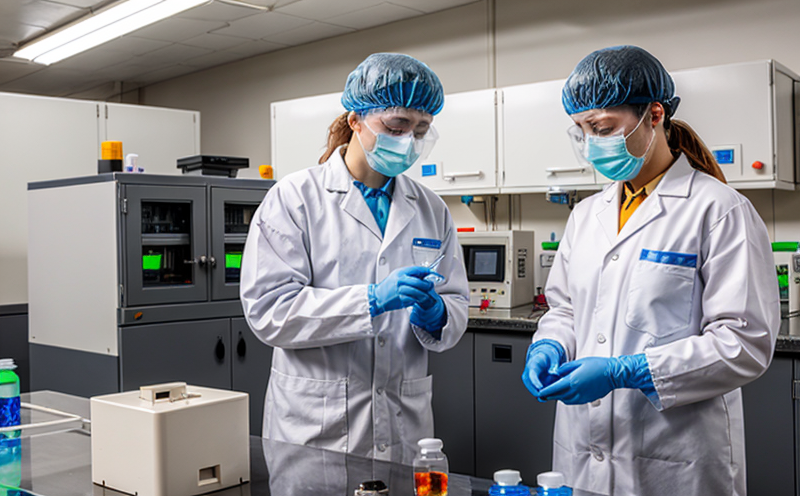EN 18902 HMF Detection in Molasses-Based Foods
The European standard EN 18902 provides a method for determining 4-hydroxy-1,4-naphthoquinone (HMF) content in molasses-based foods. HMF is a by-product of the thermal degradation of fructose and glucose sugars and can be formed during the processing or storage of these materials.
This test ensures that food products remain safe for consumption by minimizing the presence of harmful substances derived from improper manufacturing processes. Molasses, which are a byproduct of sugar refining, commonly contain HMF due to its formation during thermal processing steps. Monitoring and controlling HMF levels is critical in maintaining product quality and safety.
The standard applies primarily to products such as molasses-based syrups, sauces, and beverages where the presence of elevated HMF concentrations could affect the taste, color, and shelf-life of the final product. Ensuring compliance with this test can also help manufacturers avoid potential legal issues related to food safety regulations.
The testing procedure involves extracting HMF from a sample of molasses-based food using an appropriate solvent followed by quantitative analysis via high-performance liquid chromatography (HPLC). This method ensures accurate quantification and identification of the compound within specified limits as outlined in EN 18902. The detection limit is set at 1 mg/kg, which allows for precise measurement even when HMF levels are very low.
Compliance with this test not only helps maintain product quality but also ensures that food products meet strict regulatory requirements set by authorities like the European Commission and World Health Organization (WHO). By adhering to these standards, manufacturers can gain consumer trust and ensure their products remain competitive in both domestic and international markets.
Implementing EN 18902 testing is particularly important for companies operating within industries where molasses plays a significant role. These include sugar refining plants, food processing facilities that produce syrups or sauces, as well as beverage manufacturers who formulate their products using molasses.
- Identifies HMF present in molasses-based foods
- Ensures compliance with European standards and regulations
- Aids in maintaining product quality throughout the supply chain
- Helps avoid potential legal issues related to food safety laws
- Enhances consumer confidence through transparent testing practices
To summarize, adhering to EN 18902 HMF detection is essential for ensuring safe and high-quality molasses-based foods. It allows manufacturers to monitor the formation of potentially harmful compounds during processing stages while complying with international standards.
For more information on how Eurolab can assist your organization in implementing this test, please contact our team directly.
Applied Standards
The EN 18902 standard specifies the procedure for determining HMF content in molasses-based foods. This includes the extraction method used to isolate HMF from the sample and subsequent analysis using high-performance liquid chromatography (HPLC). The standard also sets out limits on acceptable levels of HMF, ensuring that processed food products remain safe for consumption.
Specifically, EN 18902 outlines detailed steps for preparing samples, selecting appropriate solvents, optimizing HPLC conditions, and interpreting results. These guidelines are designed to provide consistent and reliable measurements across different laboratories, making it easier for manufacturers and regulators alike to compare findings.
Compliance with this standard is crucial because non-compliant products can lead to health risks associated with excessive HMF consumption. Moreover, failing to meet these requirements may result in legal action or reputational damage if consumers become aware of substandard practices within your organization. Therefore, it's important for businesses operating in the food industry to stay updated on relevant standards and implement necessary measures.
By following EN 18902, companies can demonstrate their commitment to quality assurance and safety in every step of production processes involving molasses-based materials.
Eurolab Advantages
At Eurolab, we pride ourselves on offering comprehensive services tailored specifically towards helping clients achieve regulatory compliance. Our team of experts is well-versed in interpreting complex standards like EN 18902 and providing detailed guidance throughout the implementation process.
- Expertise: Our analysts possess extensive experience working with molasses-based products, ensuring accurate results every time.
- Technology: We utilize state-of-the-art equipment including HPLC systems to perform precise and repeatable analyses.
- Quality Assurance: All our laboratory practices follow strict protocols established by ISO/IEC 17025, guaranteeing reliability in all reports issued.
In addition to technical excellence, Eurolab offers flexible service options that cater specifically to individual client needs. Whether you require one-time testing or ongoing support for continuous monitoring programs, we have solutions available. Our goal is always to provide efficient and cost-effective services without compromising on accuracy or integrity of results.
Choose Eurolab for all your molasses-based food testing requirements - let us help ensure that your products meet stringent quality standards while remaining compliant with relevant regulations.
Why Choose This Test
- Ensures Safety: By detecting HMF early, potential health risks are minimized before they become significant issues.
- Aids Compliance: Keeps your operations aligned with current EU directives and international best practices.
- Promotes Quality: Helps maintain consistent product quality throughout the supply chain by identifying deviations promptly.
- Builds Trust: Demonstrates a strong commitment to consumer safety through transparent testing procedures.
These benefits make EN 18902 HMF detection an indispensable tool for any business dealing with molasses-based foods. Not only does it protect consumers, but it also strengthens your brand reputation and enhances market position.





